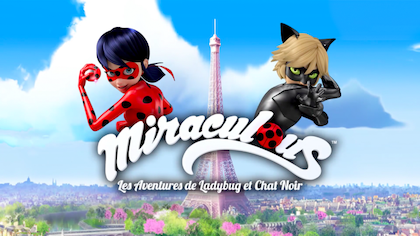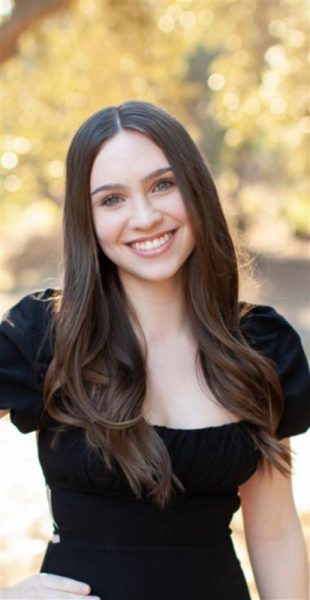Success of book to movie adaptations
How does a novel become a box office biggie?
Ever since Hagrid, gate keeper at Hogwarts School of Witchcraft and Wizardry, revealed to the masses that the young Mr. Potter was a wizard, the world has spiraled into a tail spin. Now, millions of children anxiously await for the day their owls arrive and sweep them out of the Muggle World.
Arguably, Harry Potter has been the most successful movie series in the last century. It averaged 8.5 million dollars per movie, and has made a total of 7.7 billion dollars total. But, as some forget, Harry Potter and all his successes were first translated through the written word.
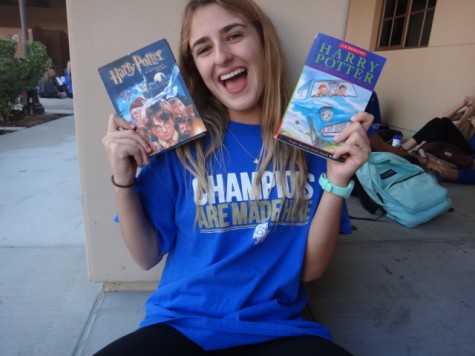
Senior Amanda Marino shows equal love for Harry Potter in his visual and print form.
Initially composing her famous tale on a café napkin, J.K. Rowling later went on to become one of the most acknowledged authors in the world. Her stories have inspired a whole generation of “wannabe” wizards.
“I just fell in love with the characters and the storyline and the way she wrote it,” said senior Ally Carey, Harry Potter connoisseur. “It’s just amazing.”
Most avid readers will warn the “other half” — those who aren’t as into books — to read the stories before you see the movies. First off, this is because the book is almost always better than the movie; second, when you read a book you picture the story the way you want to see it. Books are like your favorite television show, but their animation is created in your own mind, free from Hollywood’s harmful influence.
Out of the movies that were books first, only some were successful, such as Harry Potter, The Hunger Game, The Lord of the Rings, etc., but others were box office flops. So what makes some adaptations, such as Harry Potter, more successful than others?
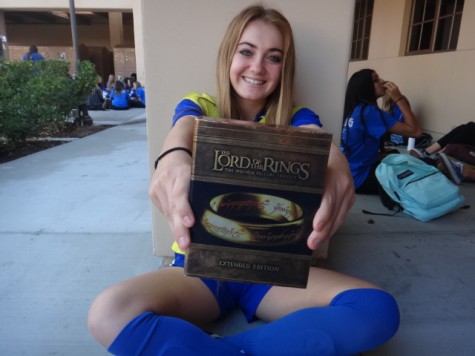
Senior Jorden Christensen with the Lord of the Rings Trilogy, one of the most successful book to movie adaptations.
Tip #1 to production companies: Choose actors/actresses that actually fit the role.
“I think that the most important thing about adapting a book into a movie is the characters and making sure the characters are as well developed in the movie as they are in the book,” said senior Noelle Kendall.
Casting is a huge component, since fans of the books have already painted a picture in their mind of how they want the characters to look. Many times fans get angry because the actor or actress casted is “too pretty” or “too skinny.”
“People that are going to see the movie may have read the book and they fall in love with the characters, so if the characters aren’t close to what people picture in their head then they automatically aren’t going to like the movie,” Kendall said.
“Emma Watson, a.k.a. Hermione Granger, is my girl,” Carey said. “I love her. I also love Bellatrix LeStrange who [is] played [by] Helena Bonham Carter. She is just the best villain you could ever have and [you] still fall in love with her.”
Alongside the obvious attributes of a character comes the minute details. Authors are intricate in designing their characters to correspond with the struggles the characters must face. It seems silly for a 25-year-old man to be scared of his father — as in poor casting choice in Divergent — while the original book character, an 18-year-old makes much more sense.
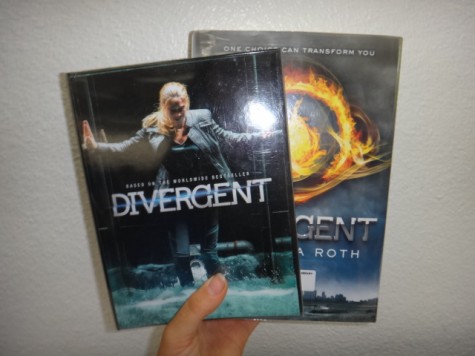
Divergent, the novel, by Veronica Roth and Divergent, the movie, directed by Neil Burger.
Harry Potter got this right, since they hired an actual twelve year old to play a twelve year old’s role. Hiring younger actors for the length of a movie series allows the audience to feel that they grow up with the characters as the actors age.
Tip #2 to production companies: Pay attention to the details.
Book lovers read every single one of an author’s words, not just a few here and there. Movie producers need to do the same.
“The only thing that always bugged me was that Daniel Radcliffe had blue eyes, but Harry, in the book, had green eyes,” Kendall said. While movie producers would not have dared to leave out Harry’s scar, his green eyes were just as important to Harry’s avid readers.
In the film version of Percy Jackson and The Olympians, producers thought they could skate by with a completely different storyline as long as Annabeth, a protagonist, had blonde hair. While Annabeth’s hair was an important characteristic to include, it didn’t make up for the fact that the story was all wrong.
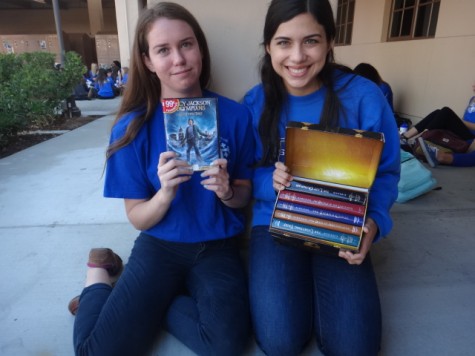
Seniors Jordan Lee and Kristen Walker have mixed reactions to the Percy Jackson legacy.
Tip #3 to production companies: Stick to the storyline.
One of the most important components of a good book-to-movie adaptation is rather obvious, yet some production companies can’t take a hint: stick to the storyline! There’s a reason why the books are so beloved in the first place.
“If they don’t follow the story line all the fandom gets [angry],” Carey said. “You really have to keep to the original author’s message.”
Changing an ending or any crucial part of the story can be detrimental to both the ratings and the potential for a second film. Kendall attests to this by saying she loved the Divergent adaptation until the inaccurate ending put a damper on her viewing experience.
The Mortal Instruments fandom also suffered when the production company changed the ending, which made the continuation of the series almost impossible.
For all the future film guys out there, you will now be ultra-successful thanks to these three handy tips. Of course, you must start with the book because if the book is not worth the read, the movie won’t be worth the watch. Better start reading…who knows which book or series will be the next to surpass Harry Potter’s level of success.

